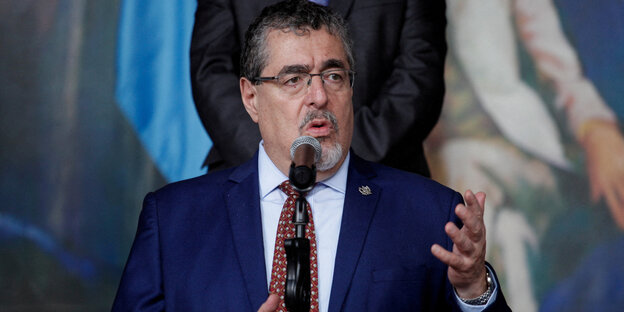The new president of Guatemala, Bernardo Arévalo, received the support of the indigenous authorities, but also from the international side. A novelty.

Hope for a future without corruption Photo: Fredy Rodríguez/Reuters
January 14 was the day of hope for many Guatemalans: on Sunday, Bernardo Arévalo was sworn in as the new president in Guatemala City. There had been doubts about this for a long time, because Arévalo assumed power to free the country from a scourge: omnipresent corruption.
Depending on the source, it consumes up to 40 percent of the national budget and, de facto, a political, military and business elite has been squeezing the Guatemalan state for decades. Guatemala has been one of the lowest places in the region on Transparency International's list for years, and the trend is declining. Guatemalans have been taking to the streets against this for years and on August 20 they elected by a clear majority a president who credibly promises to take action against this. The reaction of the highly corrupt political-military-economic spectrum, also known in Guatemala as the “Pact of the Corrupts”, is clear: all levers were used to prevent Arévalo from taking office in the first place.
But the informal alliance, which has excellent connections with organized crime, did not have massive resistance from the civilian population. Protests against Arévalo's deportation have continued since October 2. First, the indigenous minority, who make up about 44 percent of Guatemala's 18 million people, paralyzed the country with road blockades for more than three weeks. When this threatened to escalate, indigenous authorities changed strategy and moved the peaceful and highly disciplined protests to the Public Ministry, the country's Attorney General's Office, Parliament and other central state institutions.
The indigenous population more present than ever
Not only the duration, but also the participation of so many peoples, mostly indigenous, in this marathon of protests is a novelty in the history of Guatemala. Never before had the indigenous population been so present, never before had its authorities been invited and heard in chambers of commerce, embassies and ministries. There is a reason for this: indigenous peoples have recognized that the democratic model, from which they have never benefited, offers them the best prospects for presenting and implementing their fundamental demands.
This is new in Guatemala and has to do with a slowly but steadily increasing level of education in indigenous structures. Own media at local and national level such as the online portal Community Press, Indigenous law firms defending the rights of indigenous peoples in Guatemala are just two striking examples of this. Something has clicked in indigenous structures, perhaps not across the board, and the current unity does not necessarily have to last. However, the indigenous authorities who came to the capital for the swearing-in ceremony made it clear that they want to support the new government in the long term.
This is also new in Guatemala, where civil society has been systematically weakened in recent years. Newspapers had to close, journalists, environmental activists, but also lawyers ended up in prison and many went into exile because the corrupt government of President Alejandro Giammattei did not give them room to breathe and at the same time filled their pockets. Indigenous authorities, including an increasing proportion of women, have reached this void.
Something clicked in the indigenous structures, which also has to do with the increasing level of education.
Thanks to their sustained and massive capacity for mobilization, they drew attention to the largest country in Central America, clearly identified the problems in conversations with foreign embassies and, like President-elect Bernardo Arévalo, traveled to the capitals of the region and also to Brussels and asked for support.
He failed several times in democratization
This has made the Guatemalan crisis, which represents a politically unstable region, internationally visible and has put it in the focus of attention of local actors, the Organization of American States (OAS), the US, but also the EU. The OAS, long a paper tiger, took the lead. He called from the beginning to the Guatemalan president, Alejandro Giammattei, so that the transfer of government affairs be transparent and fair. The opposite happened: on December 8, the corrupt and politically active Attorney General's Office did everything possible and tried to annul the August 20 elections due to irregularities and marginalize the elected president Arévalo at the finish line.
Three days later, the United States reacted and revoked the US visas and access to US banks of 300 Guatemalans from political, business and government institutions.
That was just the beginning: a day later, the EU Parliament called on the EU Commission, by 432 votes to 9, to impose entry restrictions for those involved in the “corrupt pact”. The same day, the OAS decided, without a dissenting vote and one abstention, to resort to sanctions that could have extended to the exclusion of Guatemala from the confederation of states. This unequivocal broadside against democratic structures in Guatemala had never happened before and had an impact: on December 14, the Constitutional Court declared both the election and the transfer of power to Arévalo legal. A historic success, the country has suffered several disappointments in the past in its democratization efforts.
This time they could bear fruit. But this requires not only an active civil society but also permanent international support. This is something that should have been done a long time ago, not only for Guatemala, but for the entire extremely fragile region.